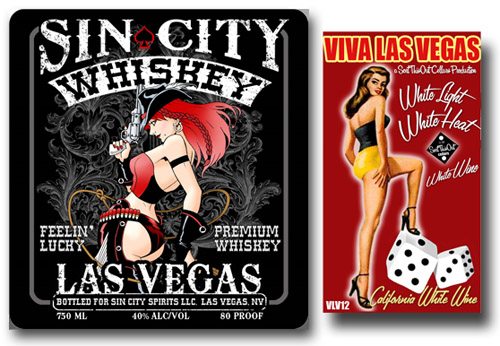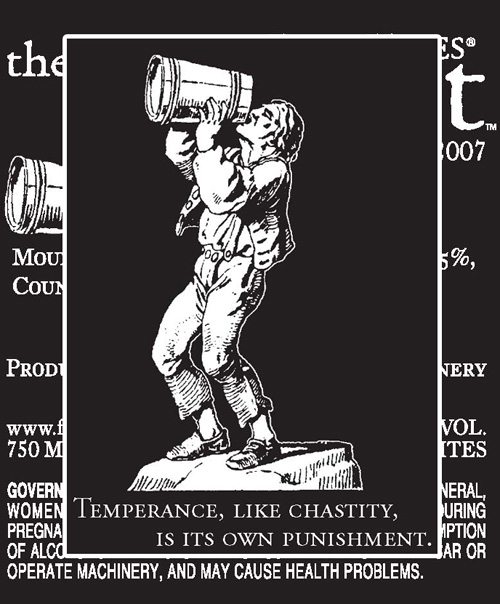I felt sure this statement was famous and handed down from the ages. But even the mighty Google has not been able to locate the origin of this statement. The Peasant is 15.3% red wine produced by Four Vines Winery of Paso Robles, California. The label says: “Temperance, like chastity, is its own punishment.” Temperance and chastity are two of the seven virtues. For each of the virtues, there is a corresponding sin, totaling “seven deadly sins.” In the case of this label, temperance opposes gluttony and chastity opposes lust.
Continue Reading Leave a Commentsin
Vice

Here is a “delightfully chilling blend of Canadian icewine and vodka ~ VICE.” It is produced by Vineland Estates Winery, in Ontario, “one of Canada’s oldest and most renowned wineries.” The Vice website tends to suggest that Vineland would have liked to present this as a “martini,” but TTB can be protective of this term, and so it looks like Vineland settled for the term “cocktail” instead. Speaking of vice, perhaps it’s time to sort out whether we are in the “vice” business or not. The Online Etymology Dictionary defines “vice” as “moral fault, wickedness.” The term dates back at least 700 years, to about 1300, from French. I can think of many things more wicked and fault-worthy than a 45 proof wine concoction, taxed and regulated out the wazoo. If this is vice, what is virtue? Here is a lawyer who scrupulously gravitates toward vice matters in his practice.
Continue Reading Leave a CommentMilk from Dragons, Grapes and Devils

In many areas, TTB is fairly literal-minded. For example, if you are bound and determined to mention energy on your label, you are unlikely to get very far, without much regard to context, as in this example. Likewise, good luck if you want to use the term “organic” on anything not in line with the organic rules. In other areas, though, TTB will view a term much less literally. Mother’s Milk Shiraz is one such example. As best I can tell, it contains no milk. There is a recognition that the term is not to be taken seriously, even though it is quite possible to make a wide variety of alcohol beverages with and from real milk. This vodka distilled from milk is but one example. If you gave up Mother’s Milk before third grade, you may prefer Dragon’s Milk. Another alternative is Devil’s Milk. Even without ingredient labeling I am reasonably sure that the Devil contributed no milk whatsoever to DuClaw’s ale.
Continue Reading Leave a CommentTags: organic/vegan/green, policy, sin, wholesome
F-Words, F-Bombs and Booze, Part 3

Way back in December of 2008 we ran Part 1 and Part 2. We didn’t really expect to see too many more variations on this theme, or that it could go a whole lot further. But alas we may have underestimated the frat-boy contingent of the alcohol beverage industry. Not that we think it does or should offend any “adult beverage” consumer. Perhaps the liqueur is Chinese and pronounced Fu-Chen. Perhaps the ale is German. It’s quite possible that our mind is in the gutter, and these labels have nothing whatever to do with sex, but we wouldn’t put any money on it. Lest anyone be unduly offended, I have two kids and I am pretty sure it would take something more than this to set them off kilter. The Fokker Ale is made by Azalea Coast Brewing, in Wilmington, North Carolina. The Fuchen Liqueur is herbal liqueur, imported by BPNC of Temperance, Michigan. We appreciate the irony that this liquor company is situated in Temperance of all places, and a lot of other people apparently felt the same way, as the company has recently changed its name to The Temperance Distilling Company.
Continue Reading Leave a CommentTags: legally interesting/controversial, policy, risqué, sexual, sin, speech, would you approve it?
Sin City Libations

Sin City seems to be alive and well in the hearts and minds of drinkers and marketers everywhere. Sin City Whiskey (above) is imported by Side Pocket Foods of Oregon. Viva Las Vegas is a California white wine bottled by Cartlidge & Browne Winery of American Canyon, California.
Continue Reading Leave a CommentTags: business strategy, risqué, sin
Rigor Mortis Ale, Deathly Ales

There is a huge, long history of associating alcohol beverages with death and demise. In recent US history, this is famously illustrated by the Black Death Vodka episode of the 1990s. This trend shows no signs of abating. Rigor Mortis Ale is made in Quebec, Canada and is imported by Shelton Brothers. The label does not explain why the product is adorned with a rotting corpse and snails and ants. Would you rather stare at a frosty glacier or a rotting corpse as you quaff a brew? Wikipedia explains that rigor mortis is:
Continue Reading Leave a Commentpostmortem rigidity due to buildup of lactic acid, which causes “the actin and myosin filaments of the muscle fibers [to] remain linked until the muscles begin to decompose.” (In simpler terms, this means that the muscles become stiff because there is a build up of the waste of the energy producing process of the body. This buildup is because the chained tissues of muscles hook together and stick until the body starts to decompose. During decomposition, this buildup is broken down over time.) Immediately following death the body is flaccid. It becomes increasingly rigid over time due to lack of ATP and buildup of lactic acid. This process happens in stages over the first thirty six hours post...
Tags: sin, would you drink it?


